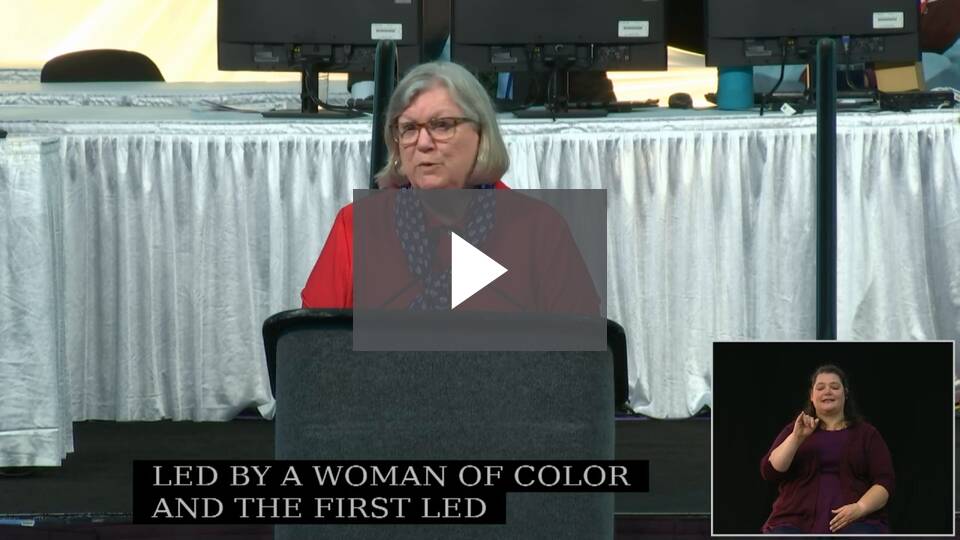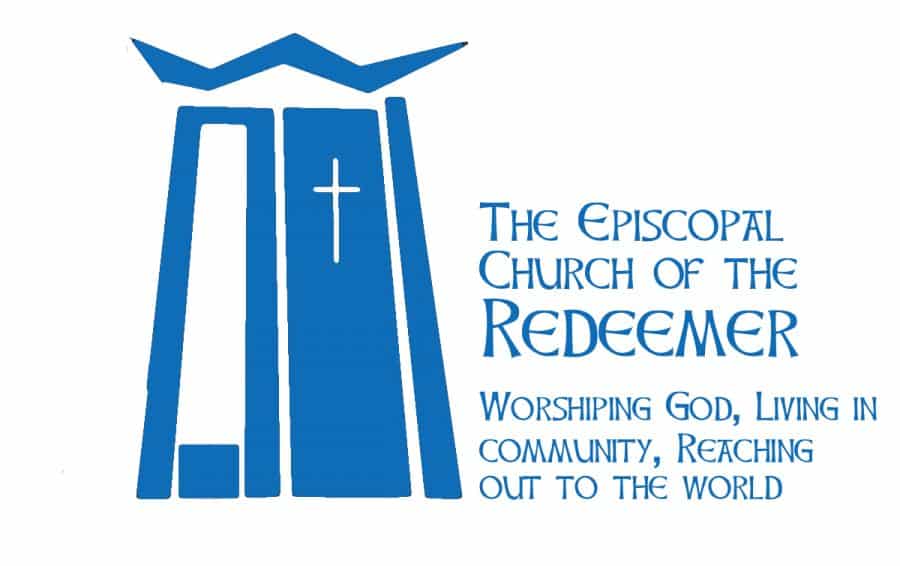[Episcopal News Service — Baltimore, Maryland] In the final moments of her service as president of the House of Deputies on July 11, 2022, the Rev. Gay Clark Jennings described her journey to leadership in The Episcopal Church and urged deputies to embrace the generational change that is taking place and to stay committed to working for structural change to make the church more inclusive.
Jennings preached her final sermon as president during Morning Prayer on July 9.
She was elected president of the House of Deputies at the 77th General Convention in 2012 and was unopposed for reelection in 2015 and 2018. She is the third woman, and the first ordained woman, to hold the position since General Convention was created in 1785.
Giving thanks for what has happened
In her remarks, she gave a special thanks to her husband, Albert, for his support of her ministry of leadership, and to their son, Sam. She said her beloved daughter, Lee, died 12 years ago, “I know how proud she would be.”
You will be in a House of Deputies that the founders of this church quite literally could not have imagined.
The Rev. Gay Clark Jennings
Jennings told deputies that she has sought to empower new leadership throughout her presidency, just as former House of Deputies President Pamela Chinnis did in 1994 in asking Jennings, then a second-term deputy, to serve as a press briefing officer and later as chair of the Committee on Canons. It was in that role, Jennings said, “I discovered I like to be called Madame Chair.”
The House of Deputies is an engine for renewal and reform
Jennings said she shared her story not only to reminisce but to remind those assembled of “the way that the House of Deputies, General Convention after General Convention, serves as an engine of renewal and reform and resurgence for our church.”
She noted that she was handing the president’s gavel to a new president, Julia Ayala Harris, and the House of Deputies then would be led by two women of color. Ayala Harris is Latina, and newly elected vice president the Rev. Rachel Taber-Hamilton is Shackan First Nation. “You will be in a House of Deputies that the founders of this church quite literally could not have imagined,” she said.
Jennings added, “This kind of change, this seismic, generational-shifting, paradigm-straddling change, is a cause for enormous celebration.” However, she warned, “It is not enough simply to appoint and elect young people and people of color to lead you. You must also support them, encourage them and work with them to change the structures and the systems that perpetuate racism and misogyny that is still endemic in our church.”
She noted especially passage by this General Convention of Resolution A125, which creates the Episcopal Coalition for Racial Equity and Justice. This action, Jennings said, “provides the opportunity to change the structures of the church to be more committed to racial justice and equity, to root out as the systemic racism that too often prevails.”

President Jennings honored for her work
A resolution honoring Jennings’ service to the House of Deputies was passed earlier in the session by standing ovation. The resolution then was sent to the House of Bishops for final approval, where it also was passed with sustained applause.
—Melodie Woerman is a member of the ENS General Convention news team and is the former director of communications for the Diocese of Kansas.

What happens at General Convention?
The legislative process of General Convention is an expression of The Episcopal Church’s belief that, under God, the Church is ordered and governed by its people: laity, deacons, priests, and bishops.
The General Convention is the Church’s highest temporal authority. As such, it has the following power:
- Amend the Constitution and Canons of the Episcopal Church
- Amend the Book of Common Prayer and to authorize other liturgical texts
- Adopt the budget for the Church
- Create covenants and official relationships with other branches of the Church
- Determine requirements for its clergy and other leaders
- Elect its officers, members of the Executive Council, and certain other groups
- Delegate responsibilities to the Interim Bodies of The Episcopal Church
- Carry out various other responsibilities and authority

Church of the Redeemer
Church of the Redeemer: Worshiping God, living in community, and reaching out to the world around us. We are an Episcopal Church serving north King County and south Snohomish County. We welcome you be with us as we walk the way of Jesus.
Church of the Redeemer is at 6210 Northeast 181st Street in Kenmore, Washington. We are a short distance north of Bothell Way, near the Burke-Gilman Trail. The entrance looks like a gravel driveway. The campus is larger on the inside than it is on the outside. And we managed to hide a large building on the side of a hill that is not easily seen from the street.
The Episcopal Church welcomes you.





